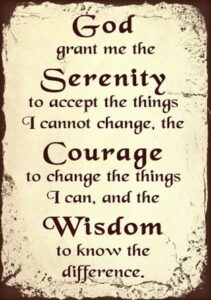We all face challenges, uncertainties, and disappointments. These are features of human life. The question is how we react to them.
Often the way we react to something ends up being worse than the thing itself—causing us more pain for much longer. We wallow in resentment or bitterness, adopt a victim mentality, or ruminate and complain, extending the cycle of misery. When we take something difficult and add resistance to it, it only adds to our suffering.
One powerful practice to break this cycle is “radical acceptance,” accepting situations outside our control without judging them. The idea is to reduce the pain and suffering associated with challenging situations.
Radical acceptance involves accepting reality as it is, so we don’t needlessly extend an emotional reaction that makes it worse. With such a practice, we’re building up our tolerance for distress, which can be quite valuable in all sorts of circumstances. Essentially, we’re preventing pain from turning into further suffering.
Such acceptance makes great sense on paper but can be exceptionally difficult to do in practice, especially given the way we’re wired. Our emotions come strong and quick, and they can flood our system with anger, stress hormones, and other physiological phenomena if we let them.
Can we interrupt the circuit and bring calm and more productive responses instead of becoming the victim of emotional flooding? Can we learn to move on from our initial responses more quickly and effectively?
Accepting things as they are means embracing the present moment and no longer resisting reality. It means acknowledging what’s happening without denying or avoiding it or wishing it away.
With such a practice, we focus on the things we can control, letting go of things we can’t.
Can we learn to accept that life can be good and worthwhile even when it includes pain and suffering? Can we let things go instead of letting them gather inside of us, forming reserves of bitterness and resentment?

Take the Traps Test
We all fall into traps in life. Sometimes we’re not even aware of it, and we can’t get out of traps we don’t know we’re in. Evaluate yourself with our Traps Test.
What Acceptance Doesn’t Mean
In this context, accepting things as they are doesn’t mean being complacent, avoiding difficult issues, settling, or giving up on our goals and aspirations. This kind of acceptance doesn’t mean approving of bad situations or passively accepting situations like manipulation, injustice, harassment, or abuse. Acceptance doesn’t mean condoning or agreeing with things, and it doesn’t mean that we stop tending to the fire in our belly or taking action.
Rather, acceptance means that we stop fighting reality. Why not acknowledge and work with it instead? Acceptance means taking a productive, compassionate, and nonjudgmental approach to reality, because it serves us and those around us better.
Clearly, part of the challenge involves knowing when to take reasoned, wise action and when to engage in radical acceptance so that we don’t get caught in downward spirals. Also, acknowledging the current reality without denying it helps free up our thinking so we can come up with new ideas for appropriate actions to take, because we’re using the more advanced parts of our brain.
The Benefits of Acceptance
There are many benefits that accompany acceptance. It can improve not only our mental and physical health but also our relationships and performance. For example, this kind of acceptance can:
- reduce anxiety and lead to less tension and conflict in our lives
- avoid triggering our stress response (which negatively affects our sleep quality as well as our immune cardiovascular, and digestive systems)
- help calm our nervous system and lower our cortisol levels
- free up mental space and energy for coping and problem-solving
- increase our happiness and wellbeing
- help us appreciate what we have and cultivate optimism and joy
- foster trust and intimacy in our relationships
- help us stop trying to change others (which often leads to frustration and resentment)
- improve our communication and help us listen more attentively to others
- help us resolve conflicts more effectively
- boost our performance since we’re accepting challenges and opportunities and no longer avoiding difficulties
How to Practice Radical Acceptance
How does acceptance work in practice? How can we develop and employ such acceptance even in challenging situations? Here are practical steps we can take to develop this capacity:
- Perceive things as they are, being an observer instead of a judge or victim. Let go of judging and resisting reality.
- Notice when we’re questioning reality or fighting it, often revealed by troubling emotions like irritability or resentment.
- Recognize if there are patterns (e.g., similar situations) in which we keep falling into this trap.
- Live in the present moment and let go of the past and future.
- Remind ourselves that things that have happened had causes and we can’t change them because they’re in the past.
- Practice accepting reality as it is with our whole self, including mind, body, and spirit (including relaxation techniques such as meditation or deep breathing).
- Allow uncomfortable emotions such as sadness or disappointment to arise within us, avoiding our inclination to resist or numb them. Doing so will only allow them to linger longer.
- Direct our attention and energy toward things we can control, instead of toward negative judgments and emotional upset, and accept what we can’t control.
- Choose to be effective in challenging situations instead of reactive, hurt, or wounded.
- Focus on our own attitudes and actions, while not expecting or needing others to act according to our expectations or wishes.
- Evaluate our expectations and whether they’re realistic and appropriate or whether they’re setting us up for disappointment.
- Write down the ways we’d act if we did accept the situation and then start doing just that.
- Acknowledge that life can be valuable and worth living even when we’re feeling pain or discomfort.
- Practice these acceptance techniques over and over again so they become more automatic and habitual, maintaining faith that it will become easier over time.
- Keep the Serenity Prayer (or coping statements) close by to help us avoid reverting to unproductive old ways.
“God, grant me the serenity to accept the things I cannot change,
courage to change the things I can,
and wisdom to know the difference.”
-the “Serenity Prayer”

Reflection Questions
- To what extent are you resisting or judging things?
- Are you letting your reactions to things make them worse over time?
- Which acceptance techniques will you try?
Tools for You
- Traps Test (Common Traps of Living) to help you identify what’s getting in the way of your happiness and quality of life
- Quality of Life Assessment to help you discover your strongest areas and the areas that need work and then act accordingly
- Personal Values Exercise to help you clarify what’s most important to you

Personal Values Exercise
Complete this exercise to identify your personal values. It will help you develop self-awareness, including clarity about what’s most important to you in life and work, and serve as a safe harbor for you to return to when things are tough.
Related Articles
- “How to Practice Acceptance When Things Are Tough”
- “What to Do About Overthinking, Rumination, and Worrying”
- “The Mental Prisons We Build for Ourselves”
- “How to Stop Catastrophizing”
- “The Trap of Dissatisfaction”
- “The Perfectionism Trap—And How to Escape It”
- “Do You Have Limiting Beliefs About Yourself?”
- “Getting Good at Overcoming Fear”
- “The Complacency Trap”
- “Tired of Settling? How to Light Your Life and Work on Fire”
- “On Spirituality and the Good Life“
Postscript: Inspirations on Acceptance
- “The primary cause of unhappiness is never the situation but your thoughts about it. Be aware of the thoughts you are thinking. Separate them from the situation, which is always neutral, which always is as it is…. When you live in complete acceptance of what is, that is the end of all drama in your life.” -Eckhart Tolle, The Power of Now
- “Acceptance means events can make it through you without resistance.” -Michael Singer, The Untethered Soul: The Journey Beyond Yourself
- “The more clearly you understand yourself and your emotions, the more you become a lover of what is.” -Baruch Spinoza, philosopher
- “Radical Acceptance is the willingness to experience ourselves and our lives as it is…. There is something wonderfully bold and liberating about saying yes to our entire imperfect and messy life…. Radical Acceptance is the gateway to healing wounds and spiritual transformation. When we can meet our experience with Radical Acceptance, we discover the wholeness, wisdom and love that are our deepest nature…. The boundary to what we can accept is the boundary to our freedom.” -Tara Brach, psychologist, author, and meditation teacher
- “Accepting people as they are has the miraculous effect of helping them improve. Acceptance doesn’t prohibit growth; rather, it fosters it.” -Marianne Williamson, spiritual teacher and author

Gregg Vanourek’s Newsletter
Join our rapidly growing community. Sign up now and get monthly inspirations (new articles, opportunities, and resources). Welcome!
++++++++++++++++++++++++++++++
Gregg Vanourek is a writer, teacher, TEDx speaker, and coach on personal development and leadership excellence. He is co-author of three books, including LIFE Entrepreneurs: Ordinary People Creating Extraordinary Lives (a manifesto for living with purpose and passion) and Triple Crown Leadership: Building Excellent, Ethical, and Enduring Organizations (a winner of the International Book Awards). Check out his Best Articles or get his monthly newsletter. If you found value in this article, please forward it to a friend. Every little bit helps!

